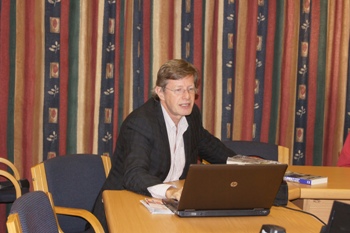The third Urban Futures Centre (UFS) seminar took place at the University’s (DUT) ESBE Boardroom, L3, S4, S Block, where Patrick Bond, Professor and Director of the Centre for Civil Society at UKZN, spoke about the contribution of former city manager; Mike Sutcliffe to the city of Durban.
DUT students, lecturers, academics from UKZN, municipal officials and other stakeholders attended the presentation. Sutcliffe managed the city from 2002 to 2012, and according to Prof Bond, his (Sutcliffe) contribution (to the city of Durban) was destructive from the standpoint of the poor and working-class people’s interests.
Prof Bond said the process of renaming the streets of Durban; which was highly controversial, blue flag beaches and environmental protests, alleged human rights abuses, transport debacle, environmental destruction, white elephant stadium and Warwick Junction saga all formed part and parcel of Sutcliffe’s road to the so-called destruction of the city.
He said the biggest issue contested by the people of Durban, to date, is the $25 billon South Durban’s port-petrochemical complex. “This is a site-specific project but one with more general lessons for grassroots contestation of industrial mal-development, in part because so many issue areas are up for contestation. There are lessons to be learned both by those who ‘govern’ Durban, and local civil society organisations which need to be taken account of to ensure that the ‘DeSuttcliffe-ising’ process takes place. Local residents’ organisations – united as the South Durban Community Environmental Alliance (SDCEA) – also offer multiple overlapping critiques of this project,” he said.
He added that this project will put more than 2000 more trucks per hour on our roads, cause a housing crisis as unbearable living conditions will displace communities and increase social decay and crime and convert the Clairwood Racecourse into a container and trucking depot.
“This project will also deny fishermen access to the beachfront and piers and increase petrochemical industry pollution-related illnesses such as cancer and asthma. It will also force small businesses to close, worsen climate change, create more corruption and put a further burden on taxpayers in addition to existing white elephants. We looking at a difficult terrain in South Africa when we have the highest interest rates behind Greece, putting a huge strain on local businesses,” said Prof Bond. He currently urges public participation on the issue of the Port and Petrochemical expansions, adding that these projects will negatively affect those residents in South Durban and is a long-standing problem which has become acute.
Prof Bond is one of UKZN’s most prolific researchers. He teaches political economy and eco-social policy, directs the Centre for Civil Society at the University of KwaZulu-Natal. His research focuses on economic justice, geopolitics, climate, energy and water. In service to the new South African government, Patrick authored and edited more than a dozen policy papers from 1994 – 2002, including the Reconstruction and Development Programme and the RDP White Paper. He is also an author and editor of Politics of Climate Justice and Durban’s Climate Gamble as well as a political economist.
– Waheeda Peters
Pictured: Prof Patrick Bond speaks about the socio-economic issues that exist in Durban post the Mike Sutcliffe era.

